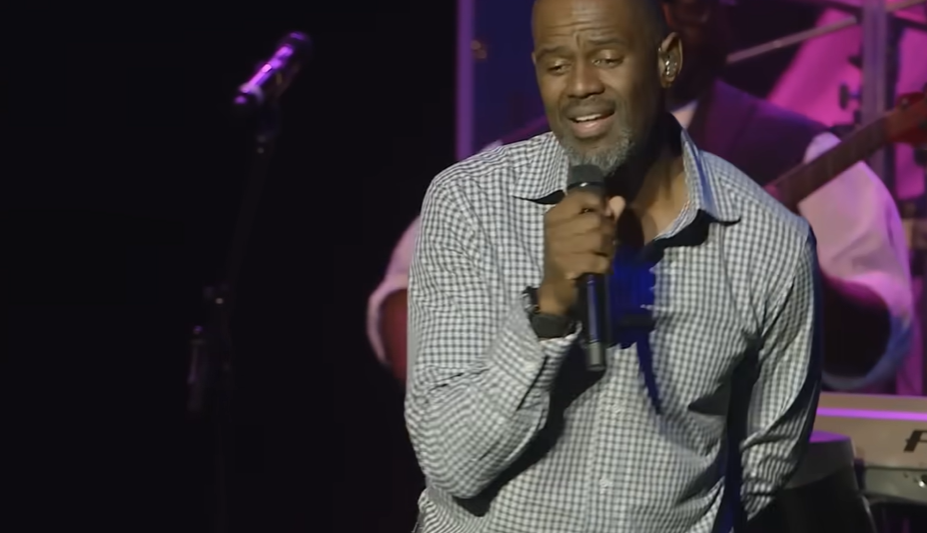The lawsuit filed by Brian McKnight against his ex-wife Julie McKnight has exposed how private conflicts can turn into public spectacles, altering reputations that have been developed over many years. McKnight, who is well-known for his deep emotional depth and smooth voice, is currently involved in a legal battle that feels extremely personal and painfully exposed. The case, which was filed in May 2025, centers on his allegation that Julie’s memoir, Mama Bear: Beautifully Blended, portrayed him as an absent father and emotionally abusive husband. He maintains that this portrayal was a blatant attack on his character.
The lawsuit claimed libel, slander, and defamation and sought $8.8 million in damages. According to McKnight, the book included intentional lies intended to damage his reputation. The accusations deeply affected an artist whose reputation was based on vulnerability and sincerity, putting him in a legal battle to defend his name rather than his songs.
McKnight claimed to have “won” the case on the internet by the middle of October. “Trying to ruin my name and bring harm to my family in a book full of lies equals $8.8 million,” he said calmly and triumphantly in a video shot in the English countryside, cigar in hand. Although his timing was very controversial, his tone was one of vindication.
Brian McKnight — Case Overview
| Category | Information |
|---|---|
| Full Name | Brian Kelly McKnight |
| Profession | R&B Singer, Songwriter, Producer |
| Date of Birth | June 5, 1969 |
| Place of Birth | Buffalo, New York, USA |
| Lawsuit Filed Against | Ex-wife Julie McKnight |
| Year of Filing | May 2025 |
| Allegations | Defamation, Libel, and Slander |
| Claimed Damages | $8.8 million (default judgment under review) |
| Public Reaction | Divided — sympathy, criticism, and disbelief |
| Reference Source | Creative Learning Guild |

The announcement was made on his late son Niko’s birthday, who died after a protracted fight with cancer. Supporters swiftly denounced the post as tone deaf, charging McKnight with putting his own ego ahead of tact. One fan summarized the emotional rift the moment caused by writing, “Making a victory video public on your son’s birthday isn’t power — it’s pain disguised as pride.”
What started out as a statement of justice turned into a social media conflagration. Although many others found the display emotionally startling, McKnight’s devoted supporters cheered his conviction. It was one of the few times a beloved character seemed to have lost the empathy that had once characterized his work. Even though he spoke with grace, his own remarks contained unintended irony for a man who was praised for his songs about empathy and community.
Afterwards, legal experts disclosed that McKnight’s declaration of victory might have been too soon. His decision was a “default ruling,” according to reports from websites like TMZ and Complex, because Julie McKnight did not first show up for court. Still, if she submitted a valid response within six months, that ruling could be overturned. Therefore, the so-called victory was conditional rather than final.
Julie’s response was subdued but powerful. She shared a straightforward Instagram screenshot of the case’s “pending” status without specifically naming her ex-husband. Quiet defiance without comments or captions. The subtle maneuver was incredibly successful in changing the direction of the conversation. Her restraint was seen as dignified by her supporters, whereas McKnight’s exuberance came across as defensive.
This disparity demonstrated how emotional intelligence is valued in contemporary celebrity culture just as highly as legal victories. The well-known conflict between authenticity and overexposure, which many artists encounter when managing their own online narrative, was mirrored in McKnight’s public strategy. Some saw his religiously charged caption, which quoted Isaiah’s prophecy that “no weapon formed against us shall prosper,” as empowering, while others saw it as performative. To critics, what was intended as a shield of belief sounded more like a claim of moral superiority.
Beyond its personal nature, the lawsuit demonstrates how defamation cases have taken center stage in the management of celebrity reputations. Similar to Cardi B’s lawsuit against blogger Tasha K or Johnny Depp’s legal battle with Amber Heard, McKnight’s case brings up important issues regarding who owns one’s own truth. However, the intimacy of his story—a family dispute that was turned into a public trial, revealing personal hurts for public scrutiny—sets it apart.
His public persona has long been marred by his family’s history of conflict. In the past, McKnight has come under fire for publicly rejecting his biological children and labeling them “evil” and “a product of sin.” In light of this, his lawsuit seems to some like yet another attempt to control the story. Others see it as a father and artist asserting his right to self-determination, despite the harshness of his methods.
The irony is evident for a singer whose career was characterized by sincere emotion and poignant ballads. Previously, songs like “Back at One” were a sign of emotional maturity; today, McKnight’s online persona exudes pride and defensiveness. Many fans find it difficult to reconcile the paradox that the man who once moved millions with his music is now upsetting audiences with his remarks.
From a wider perspective, this case illustrates how even the slightest mistake is magnified by fame. In the current media environment, an Instagram caption has the power to influence public opinion more quickly than a court decision. McKnight’s choice to declare his “victory” online before it was officially verified shows how quickly a private matter can turn into a public spectacle. Although it makes sense, the tendency to tell one’s own story can backfire when tone and timing don’t mesh well.

